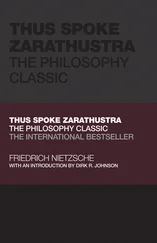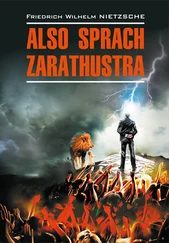ELIZABETH FORSTER–NIETZSCHE.
Nietzsche Archives,
Weimar, December 1905.
1.
When Zarathustra was thirty years old, he left his home and the lake of his home, and went into the mountains. There he enjoyed his spirit and solitude, and for ten years did not weary of it. But at last his heart changed,—and rising one morning with the rosy dawn, he went before the sun, and spake thus unto it:
Thou great star! What would be thy happiness if thou hadst not those for whom thou shinest!
For ten years hast thou climbed hither unto my cave: thou wouldst have wearied of thy light and of the journey, had it not been for me, mine eagle, and my serpent.
But we awaited thee every morning, took from thee thine overflow and blessed thee for it.
Lo! I am weary of my wisdom, like the bee that hath gathered too much honey; I need hands outstretched to take it.
I would fain bestow and distribute, until the wise have once more become joyous in their folly, and the poor happy in their riches.
Therefore must I descend into the deep: as thou doest in the evening, when thou goest behind the sea, and givest light also to the nether–world, thou exuberant star!
Like thee must I GO DOWN, as men say, to whom I shall descend.
Bless me, then, thou tranquil eye, that canst behold even the greatest happiness without envy!
Bless the cup that is about to overflow, that the water may flow golden out of it, and carry everywhere the reflection of thy bliss!
Lo! This cup is again going to empty itself, and Zarathustra is again going to be a man.
Thus began Zarathustra's down–going.
2.
Zarathustra went down the mountain alone, no one meeting him. When he entered the forest, however, there suddenly stood before him an old man, who had left his holy cot to seek roots. And thus spake the old man to Zarathustra:
"No stranger to me is this wanderer: many years ago passed he by. Zarathustra he was called; but he hath altered.
Then thou carriedst thine ashes into the mountains: wilt thou now carry thy fire into the valleys? Fearest thou not the incendiary's doom?
Yea, I recognise Zarathustra. Pure is his eye, and no loathing lurketh about his mouth. Goeth he not along like a dancer?
Altered is Zarathustra; a child hath Zarathustra become; an awakened one is Zarathustra: what wilt thou do in the land of the sleepers?
As in the sea hast thou lived in solitude, and it hath borne thee up. Alas, wilt thou now go ashore? Alas, wilt thou again drag thy body thyself?"
Zarathustra answered: "I love mankind."
"Why," said the saint, "did I go into the forest and the desert? Was it not because I loved men far too well?
Now I love God: men, I do not love. Man is a thing too imperfect for me. Love to man would be fatal to me."
Zarathustra answered: "What spake I of love! I am bringing gifts unto men."
"Give them nothing," said the saint. "Take rather part of their load, and carry it along with them—that will be most agreeable unto them: if only it be agreeable unto thee!
If, however, thou wilt give unto them, give them no more than an alms, and let them also beg for it!"
"No," replied Zarathustra, "I give no alms. I am not poor enough for that."
The saint laughed at Zarathustra, and spake thus: "Then see to it that they accept thy treasures! They are distrustful of anchorites, and do not believe that we come with gifts.
The fall of our footsteps ringeth too hollow through their streets. And just as at night, when they are in bed and hear a man abroad long before sunrise, so they ask themselves concerning us: Where goeth the thief?
Go not to men, but stay in the forest! Go rather to the animals! Why not be like me—a bear amongst bears, a bird amongst birds?"
"And what doeth the saint in the forest?" asked Zarathustra.
The saint answered: "I make hymns and sing them; and in making hymns I laugh and weep and mumble: thus do I praise God.
With singing, weeping, laughing, and mumbling do I praise the God who is my God. But what dost thou bring us as a gift?"
When Zarathustra had heard these words, he bowed to the saint and said: "What should I have to give thee! Let me rather hurry hence lest I take aught away from thee!"—And thus they parted from one another, the old man and Zarathustra, laughing like schoolboys.
When Zarathustra was alone, however, he said to his heart: "Could it be possible! This old saint in the forest hath not yet heard of it, that GOD IS DEAD!"
3.
When Zarathustra arrived at the nearest town which adjoineth the forest, he found many people assembled in the market–place; for it had been announced that a rope–dancer would give a performance. And Zarathustra spake thus unto the people:
I TEACH YOU THE SUPERMAN. Man is something that is to be surpassed. What have ye done to surpass man?
All beings hitherto have created something beyond themselves: and ye want to be the ebb of that great tide, and would rather go back to the beast than surpass man?
What is the ape to man? A laughing–stock, a thing of shame. And just the same shall man be to the Superman: a laughing–stock, a thing of shame.
Ye have made your way from the worm to man, and much within you is still worm. Once were ye apes, and even yet man is more of an ape than any of the apes.
Even the wisest among you is only a disharmony and hybrid of plant and phantom. But do I bid you become phantoms or plants?
Lo, I teach you the Superman!
The Superman is the meaning of the earth. Let your will say: The Superman SHALL BE the meaning of the earth!
I conjure you, my brethren, REMAIN TRUE TO THE EARTH, and believe not those who speak unto you of superearthly hopes! Poisoners are they, whether they know it or not.
Despisers of life are they, decaying ones and poisoned ones themselves, of whom the earth is weary: so away with them!
Once blasphemy against God was the greatest blasphemy; but God died, and therewith also those blasphemers. To blaspheme the earth is now the dreadfulest sin, and to rate the heart of the unknowable higher than the meaning of the earth!
Once the soul looked contemptuously on the body, and then that contempt was the supreme thing:—the soul wished the body meagre, ghastly, and famished. Thus it thought to escape from the body and the earth.
Oh, that soul was itself meagre, ghastly, and famished; and cruelty was the delight of that soul!
But ye, also, my brethren, tell me: What doth your body say about your soul? Is your soul not poverty and pollution and wretched self–complacency?
Verily, a polluted stream is man. One must be a sea, to receive a polluted stream without becoming impure.
Lo, I teach you the Superman: he is that sea; in him can your great contempt be submerged.
What is the greatest thing ye can experience? It is the hour of great contempt. The hour in which even your happiness becometh loathsome unto you, and so also your reason and virtue.
The hour when ye say: "What good is my happiness! It is poverty and pollution and wretched self–complacency. But my happiness should justify existence itself!"
The hour when ye say: "What good is my reason! Doth it long for knowledge as the lion for his food? It is poverty and pollution and wretched self–complacency!"
The hour when ye say: "What good is my virtue! As yet it hath not made me passionate. How weary I am of my good and my bad! It is all poverty and pollution and wretched self–complacency!"
The hour when ye say: "What good is my justice! I do not see that I am fervour and fuel. The just, however, are fervour and fuel!"
The hour when ye say: "What good is my pity! Is not pity the cross on which he is nailed who loveth man? But my pity is not a crucifixion."
Читать дальше











